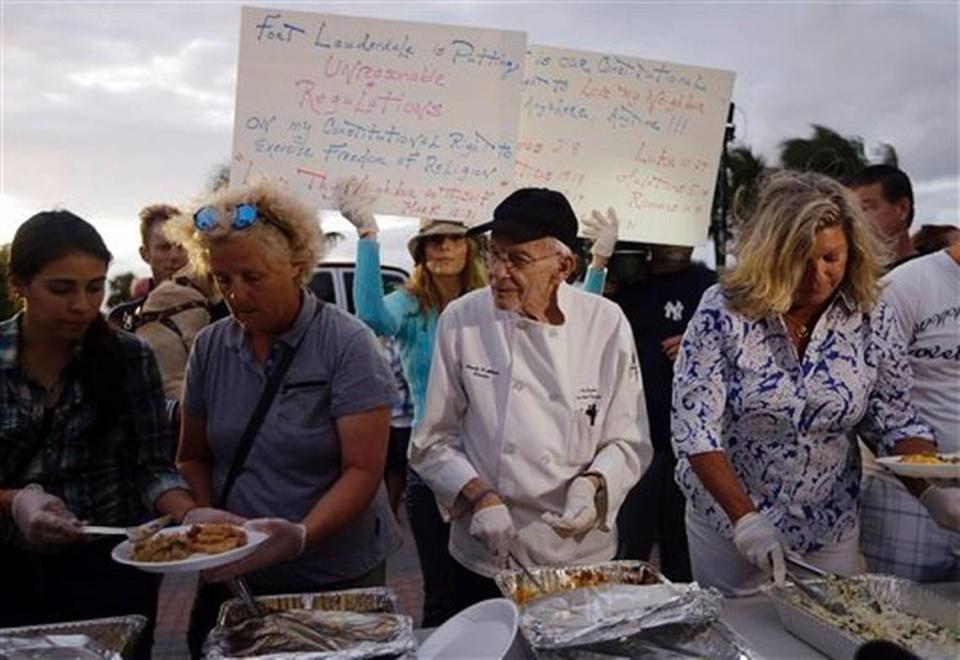‘Not a solution’: Fort Lauderdale debates how to enforce Florida’s new homeless law
Fort Lauderdale commissioners are weighing how to address homelessness in the wake of a new Florida law that bans people from sleeping or camping in public places.
During a city commission conference Tuesday afternoon, commissioners expressed concerns about arresting people who are homeless, an approach that could lead to overcrowding at the jails. The legislation, House Bill 1365, prohibits municipalities from allowing people to sleep or camp in public places, such as parks and on the beach. Starting Jan. 1, 2025, the law will allow people to file lawsuits against local governments if they fail to remove homeless people.
Fort Lauderdale Mayor Dean Trantalis, who previously said he was against the legislation, worried what the consequence would be if the city doesn’t act, adding that Fort Lauderdale has been the subject of litigation in the past regarding its aggressive approaches to homelessness. The city was sued by the nonprofit Food Not Bombs in 2015 after it banned the practice of feeding homeless people in public parks and faced another lawsuit in 2017 for clearing a downtown homeless encampment, which resulted in homeless residents’ property being destroyed.
“We cannot suffer those challenges ever again,” Trantalis said.

The city has six months to firm up plans regarding the legislation, which goes into effect Oct. 1. City Attorney Thomas J. Ansbro said that he has met with Fort Lauderdale Police Chief Bill Schultz and two city prosecutors on how to address the new law and that he has a call in to the Broward County attorney to discuss it.
“I’m hopeful that we don’t end up in a position of having to arrest people for homelessness,” he said during the city commission conference.
READ: Touting ‘law and order,’ DeSantis signs bill allowing homeless camps in South Florida
In 2023, Fort Lauderdale had 780 homeless residents, up substantially from 2022’s count of 415, according to the city’s online dashboard. The city has a goal of reducing homelessness by 250 for this year.
Trantalis noted that if homeless people are arrested in another city and brought to the Broward County Jail, they are typically released onto Fort Lauderdale’s streets. “If you have a law that says it’s criminal activity to sleep in a public place, all it does is it takes the shelter from the public place to the jail,” Trantalis told the Miami Herald after the meeting.
“So now the jail becomes an encampment for the homeless people, and that’s not a solution,” he continued. “Criminalizing homelessness is not ever a solution. So how long are we going to keep the homeless person in jail? They’ll be booked for violating the new statute, and then within an hour, they’re [released], and they’re back on the streets again. So it doesn’t really think through the real problem.”
Trantalis said the release of homeless residents from county hospitals also contributes to the uptick in Fort Lauderdale’s homeless population.
“A person goes to an emergency room, trauma or otherwise, is triaged, and when the person is released, they’re released on the streets of Fort Lauderdale, even though they may have originated in Hollywood, Davie, Coral Springs or wherever,” he said during the meeting.
RELATED: DeSantis praised a Miami Beach homeless law. Is it as ‘compassionate’ as the mayor says?
Commissioner John Herbst said that he consistently gets complaints from residents in District 1 about people sleeping on park benches along Commercial Boulevard and Federal Highway and Oakland Park Boulevard and Federal Highway.
“It’s unsustainable, and it’s an inordinate burden on the residents, but our hands have been tied,” Herbst said. “I think this legislation is going to force us to address it, but it’s like, now what?”
Herbst suggested the city hold a joint workshop with Broward County and other municipalities to address the problem and ask how they interpret the legislation and what their plan is.
“This is a regional problem that cries out for a regional solution,” he said.
Commissioner Pamela Beasley-Pittman agreed with Herbst that the issue isn’t solely a Fort Lauderdale problem and that the city should be in conversation with Broward County officials.
“It’s an issue that we’re all experiencing, and we know it’s not because people choose to be homeless. It’s an issue of wraparound services,” Beasley-Pittman said, adding that there are many reasons people become homeless, including ongoing issues with finding affordable housing.
Like Herbst, Commissioner Steven Glassman said he often receives emails about homelessness in his community. He urged the city manager and city attorney to determine what Fort Lauderdale is going to do.
“I never want to see us get to the point of Los Angeles or San Francisco or San Diego,” he said. “We’ve just got to come up with a plan on how we’re going to address this.”

